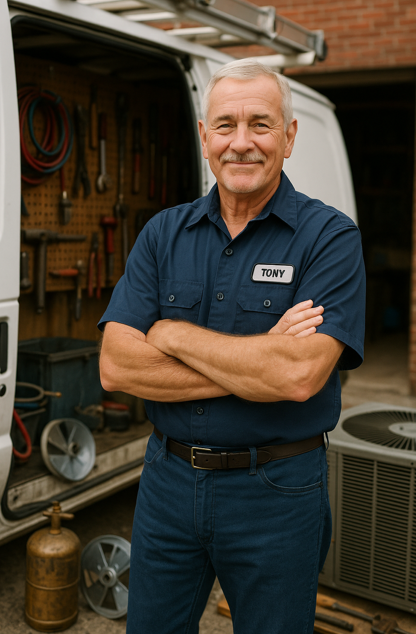Introduction
Hey there, it's Tony Marino. If you've ever wondered what makes your air conditioner tick, the answer lies in one powerful component: the AC compressor. Often referred to as the heart of your air conditioning system, the compressor plays a pivotal role in keeping your home cool and comfortable during those scorching summer months.
In this comprehensive guide, we'll delve deep into the world of the air conditioning compressor, exploring its function, how it works, signs of potential issues, and tips for maintenance. Whether you're a homeowner looking to understand your HVAC system better or someone considering a new installation, this blog will provide you with the knowledge you need.
What Is an AC Compressor?
An AC compressor is a mechanical device that pressurizes and circulates refrigerant through your air conditioning system. It's typically located in the outdoor unit of your HVAC system and is responsible for compressing the refrigerant gas into a high-pressure, high-temperature gas. This process is crucial for the subsequent steps in the cooling cycle.
According to Trane, the compressor's primary function is to increase the pressure of the refrigerant, which then allows the system to release heat and cool your home effectively.
How Does an AC Compressor Work?
The operation of an air conditioning compressor can be broken down into several key steps:
-
Compression: The compressor draws in low-pressure refrigerant gas from the evaporator coil and compresses it into a high-pressure, high-temperature gas.
-
Heat Transfer: This high-pressure gas is then sent to the condenser coil, where it releases its heat to the surrounding air and cools down, turning into a high-pressure liquid.
-
Expansion: The high-pressure liquid refrigerant travels through an expansion valve, where its pressure is reduced, causing it to cool further.
-
Evaporation: The cold refrigerant then enters the evaporator coil inside your home, where it absorbs heat from the indoor air, cooling it down.
-
Cycle Repeats: The refrigerant, now warmed, returns to the compressor to begin the cycle again.
This continuous cycle is what keeps your indoor environment comfortable. For a more detailed explanation, Carrier provides an in-depth look at how air conditioners operate.
Signs of a Faulty AC Compressor
A malfunctioning air conditioner compressor unit can lead to various issues within your HVAC system. Here are some common signs that your compressor may be failing:
-
Warm Air Blowing: If your air conditioner is blowing warm air instead of cool air, it could indicate a problem with the compressor.
-
Noisy Operation: Unusual noises, such as grinding or squealing, can be a sign of mechanical failure within the compressor.
-
Tripped Circuit Breaker: If the compressor's circuit breaker trips frequently, it may be overloaded or experiencing electrical issues.
-
Increased Energy Bills: A failing compressor can cause your system to work harder, leading to higher energy consumption and increased utility bills.
If you notice any of these symptoms, it's essential to consult with a professional HVAC technician to diagnose and address the issue promptly.
Maintaining Your AC Compressor
Proper maintenance of your HVAC compressor can extend its lifespan and ensure efficient operation. Here are some maintenance tips:
-
Regular Cleaning: Keep the area around the outdoor unit clean and free of debris to ensure proper airflow.
-
Check Refrigerant Levels: Low refrigerant levels can cause the compressor to overheat and fail. Regularly check and maintain the correct refrigerant levels.
-
Inspect Electrical Components: Ensure that all electrical connections are secure and free from corrosion.
-
Schedule Professional Maintenance: Have a licensed HVAC technician perform annual inspections and maintenance to catch potential issues early.
For more maintenance tips, The Spruce offers a comprehensive guide on maintaining your air conditioning system.
When to Replace Your AC Compressor
Replacing an AC compressor can be a significant investment. However, in some cases, it may be more cost-effective than repairing a failing compressor. Consider replacement if:
-
Age of the Unit: If your air conditioning system is over 10 years old and the compressor fails, replacement may be more economical.
-
Frequent Repairs: If you've had multiple repairs and the compressor continues to fail, replacement might be the best option.
-
High Repair Costs: If the cost of repairing the compressor is close to or exceeds the cost of a new system, replacement is advisable.
Always consult with a professional HVAC technician to assess your specific situation and determine the best course of action.
Conclusion
The air conditioning compressor is a vital component of your HVAC system, responsible for pressurizing and circulating refrigerant to cool your home. Understanding its function, recognizing signs of potential issues, and performing regular maintenance can help ensure your system operates efficiently and lasts longer.
If you're considering a new air conditioning system, the Goodman 3 Ton 14.5 SEER2 R-32 Bundle offers a reliable and energy-efficient solution. This bundle includes a high-quality compressor and other essential components to keep your home cool and comfortable.
Remember, regular maintenance and timely repairs are key to prolonging the life of your air conditioning system and ensuring optimal performance.







